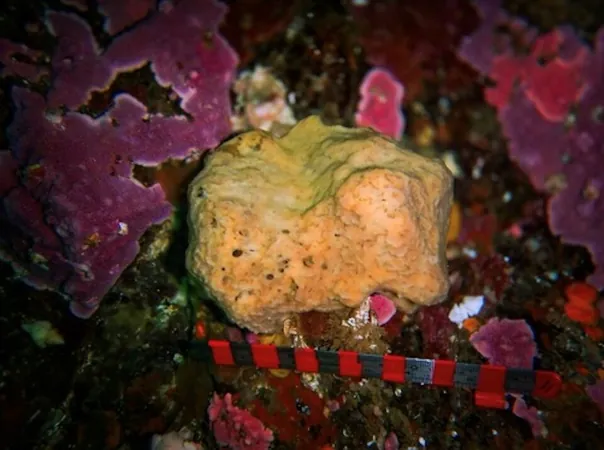
Meet Belinda: The Amazing Sea Sponge "Sneezing" for Survival Off Vancouver Island!
2025-01-07
Author: Charlotte
Introduction
Off the mesmerizing coast of Vancouver Island, scientists have made a fascinating discovery about a sea sponge named Belinda, revealing incredible adaptations that challenge our understanding of these ancient creatures. For over four years, researchers at the University of Victoria and the University of Alberta closely monitored this tennis-ball-sized Suberites concinnus sponge, which has been around for an astonishing 600 to 800 million years.
The Role of Sponges in Marine Ecosystems
Belinda has been nicknamed affectionately, but it's not just about the quirky name. Sally Leys, a biology professor involved in the research, emphasizes how essential sponges like Belinda are to marine ecosystems. These remarkable creatures act like "ecosystem engineers," filtering vast quantities of plankton and excreting particles that provide nourishment for other marine life.
Unique Behaviors Documented
Captured using advanced camera technology 23 meters underwater in Barkley Sound, the research team was able to observe Belinda's unique behaviors. They witnessed rhythmic contractions in the sponge, which resembled sneezing—a process believed to allow the sponge to expel waste and respond to its environment. This is groundbreaking as it marks the first documented instance of sponge hibernation, revealing how sponges adjust their size and activity in response to seasonal changes. During the cold winter months, Belinda shrinks to almost half its size, only to expand again as warmer temperatures arrive in February.
Environmental Correlation
What’s truly intriguing is that these contractions and sneezes seemed to correlate with environmental factors such as changes in water pressure, chlorophyll levels, and water clarity. This discovery suggests that Belinda and possibly other sponges rely on these signals to determine food availability or the onset of challenging conditions.
Implications of Findings
Dominica Harrison, the lead author of the study, pointed out the extensive implications of these findings. By observing the sponge's behavior over such an extended period, they uncovered insights into the dynamics of sponge lifecycles that had never been documented before. "Sponges are fundamental to the marine food web, serving as nature's vacuum cleaners," she noted, emphasizing their crucial role in ocean health.
Resilience in the Face of Change
The resilience of Belinda is remarkable, particularly in light of a marine heat wave known as the 'Blob’ that occurred between 2013 and 2016. During this time, observers noted a significant change in the sponge's coloration and texture, demonstrating its adaptability. Many might question how such an ancient, seemingly simple organism can endure drastic changes in its environment. Leys expressed her astonishment: "How does it tolerate such a massive change in temperature and bounce back? It’s astounding."
A Metaphor for Climate Change
Belinda not only serves as a crucial player in her ecosystem but also holds a metaphorical mirror to climate change. If future observations indicate premature hibernation or irregularities in sponge behavior, it could signal significant shifts in oceanic health, much like a canary in a coal mine warning of impending danger.
Conclusion
Next time you think about sponges, remember Belinda’s incredible journey — a testament to nature's adaptability and resilience in the face of a changing world.



 Brasil (PT)
Brasil (PT)
 Canada (EN)
Canada (EN)
 Chile (ES)
Chile (ES)
 Česko (CS)
Česko (CS)
 대한민국 (KO)
대한민국 (KO)
 España (ES)
España (ES)
 France (FR)
France (FR)
 Hong Kong (EN)
Hong Kong (EN)
 Italia (IT)
Italia (IT)
 日本 (JA)
日本 (JA)
 Magyarország (HU)
Magyarország (HU)
 Norge (NO)
Norge (NO)
 Polska (PL)
Polska (PL)
 Schweiz (DE)
Schweiz (DE)
 Singapore (EN)
Singapore (EN)
 Sverige (SV)
Sverige (SV)
 Suomi (FI)
Suomi (FI)
 Türkiye (TR)
Türkiye (TR)
 الإمارات العربية المتحدة (AR)
الإمارات العربية المتحدة (AR)